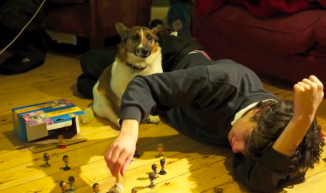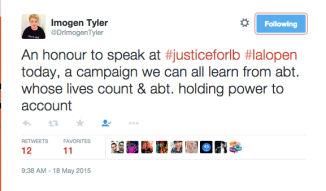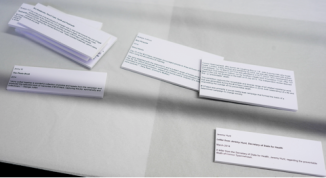Yesterday’s post has got us off to a fantastic start with telling MPs about the #LBBill, so thanks to all of you for your help with that. Today we’ve a post from Sara reflecting on LB and the #LBBill.
A while back I was asked by a journalist (could have been on BBC Radio but I can’t remember now) if the #LBBill would have made a difference to what happened to LB. I am really not a natural or keen radio or TV interviewee, particularly when it’s to talk about something so horrific, and this question struck me as simply too sad. I fluffed it.
Now it’s time for action with the Bill, it probably is helpful to think through how the proposed changes to the law could have made a difference. [Howl.] First of all, LB should never have been admitted to the unit. If a range of meaningful ‘in-home and community support services’ were available [Clause 1] I don’t think LB would have become so anxious and depressed in the first place. He loved learning to be a mechanic at TRAX. He worked there the day before he died. If there were more opportunities like that and support available to help people access the stuff they want to do (i.e., the stuff that other people just get to do), I’m not sure LB would have got so down. Oxfordshire County Council (OCC) funded support included a 5 day holiday akin to a boot camp with learning outcomes attached to every waking moment that LB hated, and a peer buddy scheme which failed to attract young people and so LB was buddied by someone our age. Simply not good enough.
Once we reached crisis point, Clause 3 would also have prevented LB’s admittance. There was no crisis care. Just a number to call and be told to go to the out of hours GP. The modus operandi, certainly in Oxon but I suspect pretty much everywhere else, is to rely on families to do the graft and when things have escalated way beyond what most people could endure or ever dream of enduring, it’s off to the ATU. Instead of chucking more direct payments (as meaningless as trying to spend drachma in the local pub) and talk of ‘respite at a building with a snooker table’ at families in crisis, the local authority should make sure a suitably trained, experienced, enthusiastic and caring team are on call and available to work with people and their families to try to avoid the need for admittance.
Slightly ironically (and I still don’t really understand this), the commissioners were apparently happy to indefinitely pay £3500 a week for substandard care at STATT. LB had no desire to live anywhere other than home at that point so Clause 2 was less relevant to us.
Clause 4, which is about securing the most appropriate living arrangement, would also have offered LB some protection against what happened. A review of the new ‘living arrangement’ (which we thought was a short term fix) 3 months from the day it commenced would have happened around June 19th. As it was, nothing was done about getting LB out of the unit other than a meeting eventually organised for July 8th (with the pushing of LB’s head teacher despite OCCs grandiose claims to the contrary).
Clause 5 was also less relevant to LB again because he was still at school and should have been living at home. Like most kids do. This clause is very important to those people who are living independently however. Most people have a choice about where they live. It’s astounding really that we’re trying to change the law to protect people from being moved against their wishes.
One of the things #JusticeforLB has achieved is shining a spotlight on the murkiest of practices that continue in health and social care. I was chatting to someone the other day who said they read our posts with a mix of incredulity and horror. That light shining is embedded within the LBBill, particularly in Clause 6 which places a duty on local authorities and the NHS to report annually on all their living arrangement activities (with full disclosure on the when, why and hows involved), and the Secretary of State to summarise these in an annual report. This is bloody brilliant really and I hope, if the Bill becomes law, there is clear and careful scrutiny of this data at both a local and national level. Using lenses with aspiration, imagination and happiness etched in gold around the frames.
Clause 7 involves sensible rewording of the Mental Capacity Act and Clause 8, again sensibly, removes learning disability/autism from the Mental Health Act. Er, because neither are mental health issues. Clause 9 makes sure that despite Clause 8, people can still access mental health services. [I know].
I also love Clause 10 [I love it all really but some bits are stand out stars for me] which is about being open and transparent with the person whose ‘care’ or support this is about. A chewy bit of ‘nothing about us without us’ which is so blinking obvious. Invite people to meetings about them, give them free support to attend, let them respond in whatever form they choose and communicate the decision from the meetings in an accessible form. Bam. As simple as. And shameful it doesn’t already happen often.
LB was only invited to the last 10 minutes of the Care Plan Approach meeting during his 107 days in the unit. He wasn’t told about the weekly meetings or informed of what was said. Despite all the nonsense about making us get his permission to visit him daily, not one member of staff communicated anything meaningful to him about why he was in there. But that was because they didn’t know why he was there and no one bothered to put the support in place to enable him to come home. A situation that would not be possible (or certainly should not be possible) if the law is changed in the way we are proposing.
The Bill finishes with a bit of welly wielding stating how the Bill will be enacted [Clause 11] because there ain’t no point in changing the law if the law ain’t followed. So that’s it. A more coherent answer to the journalist.
And the short version:
“Yes. LB would probably be lying on the floor right now, playing with his footy guys and chattering away to Chunky Stan.”
Please support the #LBBill





























